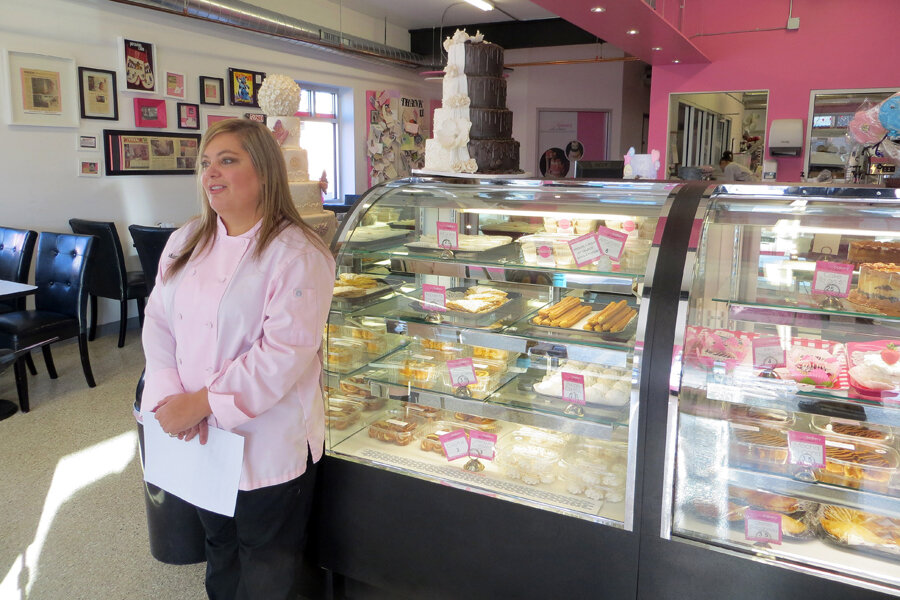Was Denver baker required to write anti-gay message on cake?
| Denver
A dispute over a cake in Colorado raises a new question about gay rights and religious freedom: If bakers can be fined for refusing to serve married gay couples, can they also be punished for declining to make a cake with anti-gay statements?
A baker in suburban Denver who refused to make a cake for a same-sex wedding is fighting a legal order requiring him to serve gay couples even though he argued that would violate his religious beliefs.
But now a separate case puts a twist in the debate over discrimination in public businesses, and it underscores the tensions that can arise when religious freedom intersects with a growing acceptance of gay couples.
Marjorie Silva, owner of Denver's Azucar Bakery, is facing a complaint from a customer alleging she discriminated against his religious beliefs.
According to Silva, the man who visited last year wanted a Bible-shaped cake, which she agreed to make. Just as they were getting ready to complete the order, Silva said the man showed her a piece of paper with hateful words about gays that he wanted written on the cake. He also wanted the cake to have two men holding hands and an X on top of them, Silva said.
She said she would make the cake, but declined to write his suggested messages on the cake, telling him she would give him icing and a pastry bag so he could write the words himself. Silva said the customer didn't want that.
"It's just horrible. It doesn't matter if, you know, if you're Catholic, or Jewish, or Christian, if I'm gay or not gay or whatever," said Silva, 40, adding that she has made cakes regularly for all religious occasions. "We should all be loving each other. I mean there's no reason to discriminate."
Discrimination complaints to Colorado's Civil Rights Division, which is reviewing the matter, are confidential. Silva said she would honor the division's policy and would not share the correspondence she has received from state officials on the case. KUSA-TV reported the complainant is Bill Jack of Castle Rock, a bedroom community south of Denver.
In a statement to the television station, Jack said he believes he "was discriminated against by the bakery based on my creed."
"As a result, I filed a complaint with the Colorado Civil Rights Division. Out of respect for the process, I will wait for the director to release his findings before making further comments."
Jack did not respond to emails from The Associated Press seeking comment. No one answered the door at the address listed for Jack in Castle Rock.
The case comes as Republicans in Colorado's Legislature talk about changing the state law requiring that businesses serve gays in the wake of a series of incidents where religious business owners rejected orders to celebrate gay weddings. Republican Sen. Kevin Lundberg said the new case shows a "clash of values" and argued Colorado's public accommodation law is not working.
"The state shouldn't come in and say to the individual businessman, 'You must violate your religious — and I'll say religious-slash-moral convictions. This baker (Silva), thought that was a violation of their moral convictions. The other baker, which we all know very well because of all the stories, clearly that was a violation of their religious convictions," Lundberg said.
But gay rights advocates say there is a significant difference in the cases. Silva refused to put specific words on a cake while Jack Phillips, the baker who turned away the gay couple, refused to make any wedding cake for them in principle.
"There's no law that says that a cake-maker has to write obscenities in the cake just because the customer wants it," said Mark Silverstein, legal director of the American Civil Liberties Union in Colorado.
Phillips' attorneys had argued in court that requiring him to prepare a gay marriage cake would be akin to forcing a black baker to prepare a cake with a white supremacist message. But administrative law judge Robert N. Spencer disagreed, writing that business owners can refuse a specific message, but not service.
"In both cases, it is the explicit, unmistakable, offensive message that the bakers are asked to put on the cake that gives rise to the bakers' free speech right to refuse," administrative law judge Robert N. Spencer said.
Phillips' attorney, Nicolle Martin, said she has sympathy for Silva, arguing she is in the same category as her client. "I absolutely support her right to decline," Martin said. "I support her right as an American to pick and choose the messages she will express."
Silva said she remains shaken up by the incident. "I really think I should be the one putting the complaint against him, because he has a very discriminating message," she said.








